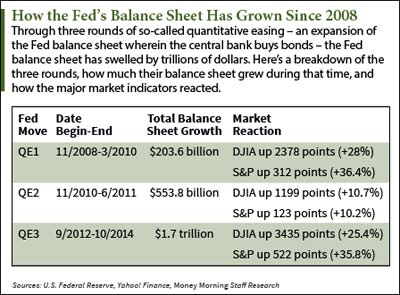 The Federal Open Market Committee (FOMC) Meeting today marks 2015's inaugural meeting of the U.S. Federal Reserve's monetary policymakers.
The Federal Open Market Committee (FOMC) Meeting today marks 2015's inaugural meeting of the U.S. Federal Reserve's monetary policymakers.
It's only been a month since the last meeting convened. But a lot has changed.
The currency markets have been shaken. The European Central Bank has announced its own quantitative easing program, just months after the Fed ended QE3. The Swiss National Bank unpegged its currency from the euro.
But as we've said before, you're better off not parsing the Fed's language with the release of every policy statement. This FOMC meeting today is no different, despite its timing.
2015 will see two divergent paths for monetary policy. But both paths are going to intersect. Neither central bank has all the answers.
Here's how this QE story will play out, and why today's FOMC meeting will just be noise in a much more troubling outlook for central banking...
FOMC Meeting Today: What the Fed Won't Say
The FOMC meeting today will be rife with the same vague statements it always has been. Although the Fed meeting could always address the biggest topic it never seems to acknowledge: QE failure.
The main problem with Fed QE is that it doesn't achieve what it aims to achieve. It doesn't grow the economy because it doesn't actually trigger spending. It can provide banks with funds to lend, but it can't encourage debt-ridden consumers and businesses to take on more borrowing.
You see, Fed QE tried to achieve many goals. The most obvious of which was to push down yields on interest-bearing debt. This forced investors into stocks.
The accompanying asset inflation bolstered stocks. It aimed to get consumers to spend. This was based on the flawed assumption that a booming market means a booming economy through a wealth effect.
But consumers and business haven't been spending. They are deleveraging - paying down debts. They're also building up savings. This is even as we're years removed from the financial crisis.
When so many consumers are saving, U.S. banks become flush with unborrowed funds. This is where the phenomenon of what economist Richard Koo calls a "balance sheet recession" comes into play.
At this point, the only remaining borrower in the economy is the U.S. government. The bank will park all those savings in U.S. Treasuries. This will give the U.S. government more room, or fiscal space, to spend.
Fed bond-buying creates further fiscal space, for two reasons.
When the Fed buys bonds, it puts more money in the banking system for which the U.S. government can issue debt against. It puts more downward pressure on rates to allow the government to borrow at low-interest. And since the Fed returns all interest payments to the U.S. Treasury, the U.S. government is off the hook for those expenses. The Fed is essentially giving the U.S. government an opportunity to borrow money for free.
There's one major flaw. Even at low interest rates, private sector borrowers aren't borrowing. They're still deleveraging. And as long as there's no lending activity in the private sector, demand is going to stay weak.
While government spending may be able to help prop up GDP in the interim, if a consumption-driven economy like the United States' is not seeing healthy borrowing and spending from the private sector, it's not going to grow meaningfully.
Today's FOMC meeting won't go into this, though. And the Fed's lesson will not be heeded across the pond.
The problems are even more pronounced with Eurozone QE...
Why Eurozone QE Is Worse than U.S. QE
The first problem with Eurozone QE is that it's not buying one bond like U.S. Treasuries. It's buying up bonds from a number of different member countries, all of whom have a debt denominated in euros.
Eurozone member countries are already bound, however tenuously, by EU treaties to keep their deficit and debt figures at a reasonable level. So already from the outset Eurozone QE eliminates what is one of the most important benefits of QE: creating more fiscal space for governments to borrow.
But let's say that the European Central Bank does abandon the already suspect and often flaunted Maastricht Treaty and its spending constraints. The Eurozone is going to run into the same problems it always has. There's no one bond, denominated in euros, issued by all governments.
Even if the ECB floods, say Portugal, with funds, the main problem won't be fixed. Assuming Portuguese banks can't find borrowers in the private sector, they won't necessarily turn to the Portuguese government as a borrower. There are 18 other countries, some of which are much more responsible borrowers than Portugal that Portuguese banks can turn to. In essence, the benefits of Portuguese banks receiving more euros will only help countries like Germany.
All have their debt denominated in euros, and the freedom to move capital across the Eurozone won't help the weaker countries create fiscal space.
The Eurozone's problems will persist - for a while. Until the whole system crumbles, or the Eurozone unites fiscal policy, there are always going to be pressures in the region.
And that's where the Fed comes in...
We can expect that over the next 15 months, the euro will continue to fall. Perhaps even to dollar parity.
This will fuel dollar strength and ignite deflationary pressures. And as that happens, the Fed will be given more room to either keep interest rates low throughout 2015 - despite the seemingly conventional wisdom that they will rise within the next couple quarters - or even embark on another QE program.
Speaking of Currencies... Unlike the euro, the Chinese yuan actually appreciated against the U.S. dollar in 2015. China wants to see its currency compete on a global stage, and has been taking "stealthy," calculated steps to set up this challenge to the King Dollar. Here's the lowdown on China's foray into the currency "big leagues..."


